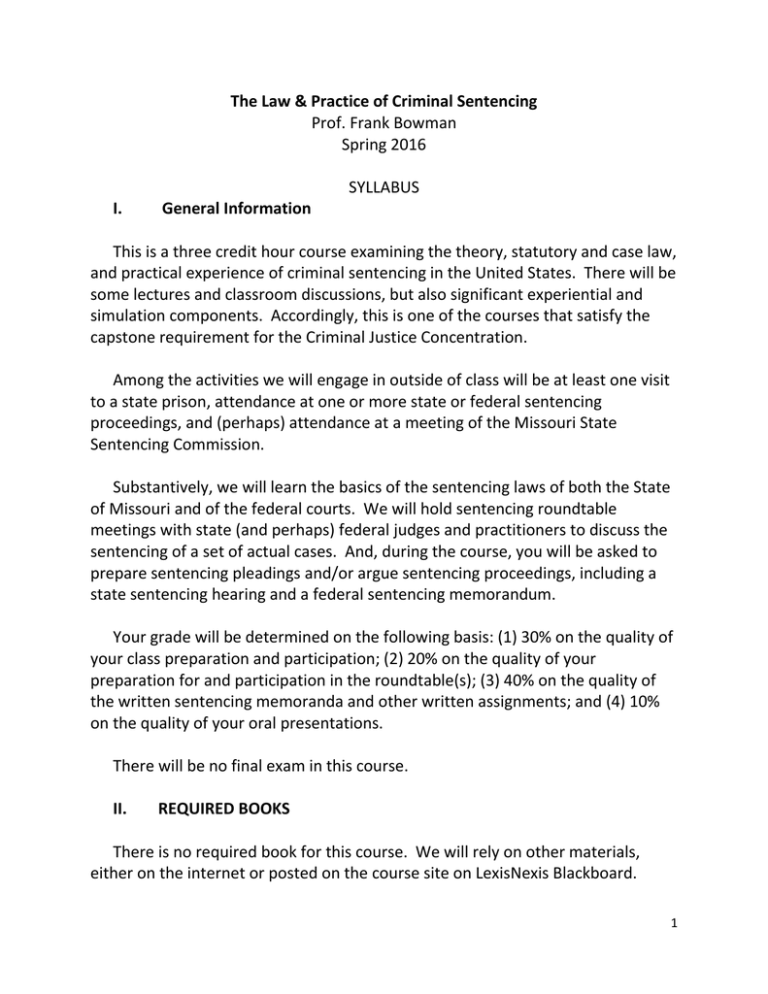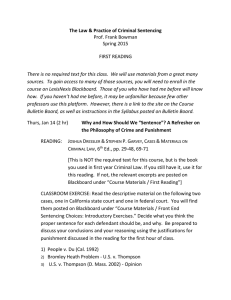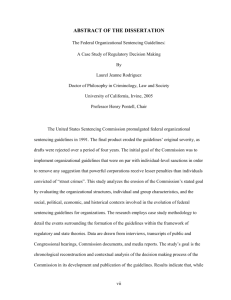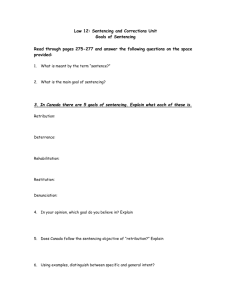The Law & Practice of Criminal Sentencing I. Prof. Frank Bowman Spring 2016
advertisement

The Law & Practice of Criminal Sentencing Prof. Frank Bowman Spring 2016 SYLLABUS I. General Information This is a three credit hour course examining the theory, statutory and case law, and practical experience of criminal sentencing in the United States. There will be some lectures and classroom discussions, but also significant experiential and simulation components. Accordingly, this is one of the courses that satisfy the capstone requirement for the Criminal Justice Concentration. Among the activities we will engage in outside of class will be at least one visit to a state prison, attendance at one or more state or federal sentencing proceedings, and (perhaps) attendance at a meeting of the Missouri State Sentencing Commission. Substantively, we will learn the basics of the sentencing laws of both the State of Missouri and of the federal courts. We will hold sentencing roundtable meetings with state (and perhaps) federal judges and practitioners to discuss the sentencing of a set of actual cases. And, during the course, you will be asked to prepare sentencing pleadings and/or argue sentencing proceedings, including a state sentencing hearing and a federal sentencing memorandum. Your grade will be determined on the following basis: (1) 30% on the quality of your class preparation and participation; (2) 20% on the quality of your preparation for and participation in the roundtable(s); (3) 40% on the quality of the written sentencing memoranda and other written assignments; and (4) 10% on the quality of your oral presentations. There will be no final exam in this course. II. REQUIRED BOOKS There is no required book for this course. We will rely on other materials, either on the internet or posted on the course site on LexisNexis Blackboard. 1 III. Reading Assignments Generally, I will give out reading assignments by posting them on Blackboard on the last day of class each week for the following week. I ordinarily do not give assignments earlier than that because I find some students, in an excess of zeal, will read far ahead and consider themselves “prepared” for class. When the time comes to discuss the material, the reading happened so long ago that the student doesn’t remember much about it. However, in the case of participatory or writing assignments, I will, of course, provide you with much greater notice. You will receive a rough schedule of the participatory components of the course soon after the class begins. FIRST READING Thurs, Jan 14 (2 hr) READING: Why and How Should We “Sentence”? A Refresher on the Philosophy of Crime and Punishment JOSHUA DRESSLER & STEPHEN P. GARVEY, CASES & MATERIALS ON CRIMINAL LAW, 6th Ed., pp. 29-48, 69-71 [This is the book you used in first year Criminal Law. If you still have it, use it for this reading. If not, the relevant excerpts are posted on Blackboard under “Course Documents / First Reading”] CLASSROOM EXERCISE: Read the descriptive material on the following two cases, one in California state court and one in federal court. You will find them posted on Blackboard under “Course Materials / Front End Sentencing Choices: Introductory Exercises.” Decide what you think the proper sentence for each defendant should be, and why. Be prepared to discuss your conclusions and your reasoning using the justifications for punishment discussed in the reading for the first hour of class. 1) People v. Du (Cal. 1992) 2) Bromley Heath Problem - U.S. v. Thompson 3) U.S. v. Thompson (D. Mass. 2002) - Opinion 2 III. Blackboard Throughout the semester, I will use the Blackboard system on LexisNexis to provide you with announcements, weekly reading assignments, supplemental materials, and so forth. (This NOT the Blackboard system used by the undergraduate university.) You must self-enroll in the course on LexisNexis Blackboard to access the material. If you are not familiar with Blackboard, please follow the following instructions to get yourself enrolled: You will need your LexisNexis password to enroll in the course, and to access materials in the course. Enrollment Instructions for LexisNexis Webcourses 1. Go to http://www.lexisnexis.com/lawschool/webcourses/ 2. Sign On using your Custom ID and Password. 3. You will arrive at a page with FAQs and manuals to help you use webcourses. Click on the Launch Web Courses button . 4. You will arrive at your personalized Web Courses Home Page. Click on the red Courses tab at the top of the page. 5. Click on the text link Browse Course Catalog 6. Click on Missouri, University of - Columbia 7. Locate the course you want to enroll in, and click on the enroll button out to the right-hand side of the course name Technical Questions or Problems? Please contact the UMC Law Help Desk at umclawhelpdesk@missouri.edu, or at 573-884-7800. 3 IV. Academic Honesty Academic integrity is fundamental to the activities and principles of a university. All members of the academic community must be confident that each person's work has been responsibly and honorably acquired, developed, and presented. Any effort to gain an advantage not given to all students is dishonest whether or not the effort is successful. The academic community regards breaches of the academic integrity rules as extremely serious matters. Sanctions for such a breach may include academic sanctions from the instructor, including failing the course, for any violation, to disciplinary sanctions ranging from probation to expulsion. When in doubt about plagiarism, paraphrasing, quoting, collaboration, or any other form of cheating, consult the course instructor. V. Americans With Disabilities Act If you need accommodations because of a disability, if you have emergency medical information to share with me, or if you need special arrangements in case the building must be evacuated, please contact Denise Boessen in Room 203 or Assoc. Dean David Mitchell. To request academic accommodations (for example, a notetaker), students must also register with the Office of Disability Services, (http://disabilityservices.missouri.edu), S5 Memorial Union, 882-4696. It is the campus office responsible for reviewing documentation provided by students requesting academic accommodations, and for accommodations planning in cooperation with students and instructors, as needed and consistent with course requirements. For other MU resources for students with disabilities, click on "Disability Resources" on the MU homepage. 4


